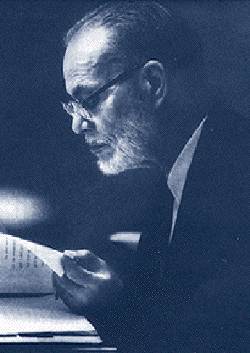 By Yasser Latif Hamdani
By Yasser Latif Hamdani
Last week (February 6) marked the 114th Birthday of one of Pakistan’s greatest unsung heroes. Once again, there was no mention of commemoration of his remarkable like. No sense of gratitude from a nation for which he did so much. He has been wiped out of our memory because he was an Ahmadi, despite his glorious contributions to Pakistan and its cause (see related post on Dr. Abdul Salam).
Sir Zafrullah Khan’s services rendered to Muslims of India, Pakistan and the Third World are second only to that of Quaid-e-Azam Mahomed Ali Jinnah. As a jurist, a diplomat and a patriot he stood head and shoulders above the lesser men who have made a mockery of our republic.
Born in 1893 in Sialkot in what was to become one of the earliest Ahmaddiya households, this small town boy rose to be one of the shrewdest legal minds of his time. His early education was in Sialkot, after which he proceeded to Lahore for his bachelors degree, under the tutelage of none other than the great Iqbal himself. He got his law degree from King’s College London in 1914, where he stood top of his class and was the first person from the Indian subcontinent to do so. He was, like most great figures of that time, called to bar at Lincoln’s Inn.
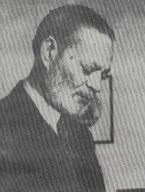
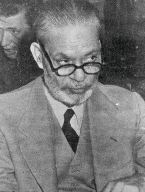
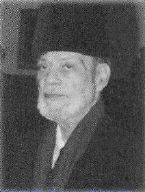


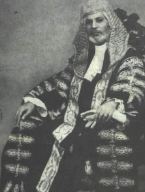
As a practicing lawyer, he soon proved his mettle and had many reported cases to his name. The first major politician to recognize Zafrullah’s talents was Sir Fazli Hussain, the founder of Unionist Party of Punjab. Starting his career in his early 30s as a member of the Punjab legislative Council, he rose to prominence as an indefatigable crusader for Muslims of Punjab. Later he represented the Muslims at round table conference and crossed swords with figures like Jinnah and Gandhi. In 1931, he became the Muslim League president and at the roundtable conference, he cornered no less a person than Churchill in a committee hearing who was forced to accept Zafrullah’s point of view.
Later he was offered a seat on Viceroy’s permanent Council, which he took to further his cause. He also served at varying times as the minister of Railways, Public works, labour and law under the Viceroy. For a brief period, he also became British India’s representative to the League of Nations, just before it was dissolved.
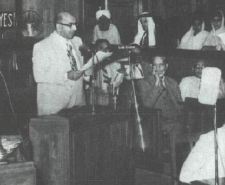
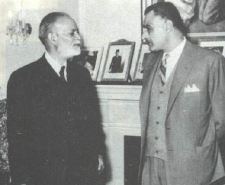
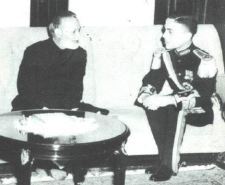
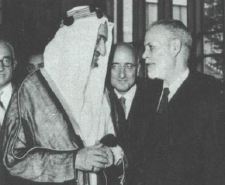
![]()
However his greatest contribution came when he drafted the famous Lahore Resolution, which till this day is the rallying point of Pakistan and Pakistani nationalism. He had been tasked with finding a common point between the popular demand for “Pakistan” and Muslim League’s all India requirements. The Lahore resolution was a broad based solution which left the door virtually open for several solutions and negotiation on the issue of partition. In essence it envisaged 2 or 3 great republics for the Muslim peoples and it was this document which forms the basis not just of Pakistan but also of Bangladesh. For this he got a lot of slack. No less a person than Khan Abdul Wali Khan highlighted Zafrullah’s religious belief to play on the popular conspiracy theory that holds Ahmadis to be British touts.
Later from 1942 onwards, he served as a federal judge (equivalent of an Supreme court C judge) of India and finally took leave on the eve of Pakistan to serve the cause of Pakistan before the Radcliffe Commission, on Jinnah’s personal request. On 25th December 1947, Jinnah appointed him the Foreign Minister of Pakistan. At the UN, Sir Zafrullah emerged as the most eloquent advocate of all third world and Islamic issues. It was Zafrullah whose efforts materialized into the UN Resolutions on Kashmir, which are the basis of the Pakistani case and grievance. Later he became the first Asian president of the International Court of Justice, a singular and unique honor for any Pakistani. He also served, briefly, as the President of the UN General Assembly. He passed away in September of 1983 in Lahore.
A prolific author on the history of Pakistan and Islam, his most famous book was titled “Agony of Pakistan” in which he makes plain the great betrayal which wrested the country from the hands of its patriots into the hands of those who were its greatest enemies. Ironically, today Jinnah’s most trusted lieutenant is not even remembered by the state which owes him so much, including its own founding document. It is the memory of people like Zafrullah Khan that will keep alive the original idea of Pakistan and there is no doubt that one day the posterity will reclaim its true destiny as a progressive and modern republic.
Yasser Latif Hamdani is a lawyer in Lahore and a researcher of the history of the Pakistan Movement.



















































[Quote]
Pointing to the way England had evolved, how there were now no Roman Catholics or Protestants in that country, only equal citizens of Great Britain, “all members of the Nation”, Jinnah told the Assembly,
“Now I think we should keep in front of us our ideal and you will find that in course of time Hindus would cease to be Hindus and Muslims would cease to be Muslims, not in the religious sense, because that is the personal faith of each individual, but in the political sense as citizens of the State…”
Liaquat Ali, the country’s first Prime Minister, was equally emphatic in repudiating the suggestion that non-Muslims would be in any way less equal than Muslims. He told the Constituent Assembly that a non-Muslim could well be the head of the administration of an Islamic State, that non-Muslims would be welcomed into the administrative services of the country. He said that the guarantees which were being provided for non-Muslims in the Pakistan Constitution were much more comprehensive than were being provided for Muslims in the Indian Constitution. Mohammed Zafrullah Khan, the country’s Foreign Minister and an Ahmediya by faith, had this to say,
“It is a matter of great sorrow that, mainly through mistaken notions of zeal, the Muslims have during the period of decline earned for themselves an unenviable reputation for intolerance. But that is not the fault of Islam. Islam has from the beginning proclaimed and inculcated the widest tolerance. For instance, so far as freedom of conscience is concerned the Quran says “There shall be no compulsion” of faith…”
When the Assembly passed its Objectives Resolution, the General Assembly of the All Pakistan Christian League hailed it, and in April 1949 declared, “In our opinion the Objectives Resolution should set at rest the doubts which often assailed the non-Muslims of Pakistan with regard to the connotation of the term ‘Islamic State’, which it was feared would be a theocratic State at variance with the democratic ideas of modern times.” We shall soon see what has happened to the Christians since, to the Ahmediyas of whom Sir Zafrullah was such a devoted member, to say nothing of the Hindus.[/Quote]
http://arunshourie.voiceofdharma.com/articles/1997 0721.htm
Mian King Faisal,
Saying something is not enough. What I have written is historically true… so you are logically upset, because if what I am saying becomes in vogue and accepted, your dukan is shuttered down forever. It is an irony, but I will not sit around and see my country go to the dogs.
[Quote]1952: UN Called Unprincipled
International Herald Tribune
Wednesday, March 6, 2002
LAHORE: Pakistan’s Foreign Minister, Sir Zafrullah Khan, told a Rotary Club dinner that the United Nations “is fast becoming a contradiction on which political proposals of major importance are carried or rejected not according to their merits, but according to the influence exercisable by the powers making them. The very principles for which the organization had been set up â€
Mera Pakistan: you have not provided any evidence that this site is promoting Ahmadiayt??
http://www.thedailystar.net/2006/08/30/d6083002032 7.htm
[quote]Way back in 1953, the Jamaat-e-Islami under Abul A’la Maudoodi created mayhem in Lahore, so much so that blood flowed along the streets of the city. And it would not stop until General Azam Khan came along. In those days of Jamaat initiation into the politics of violence, the targets were men of unimpeachable integrity like Sir Zafrullah Khan. No, no one wanted to have his tongue cut out or have his body turned into mincemeat. But he had to be pushed out of Islam because he swore by the Ahmadiyya version of faith.
In the years since then, Maudoodi’s followers have come a long way. Some of the best moments of their lives came in 1971 when Golam Azam swiftly made it a point, per courtesy of the Pakistani genocide, to offer assistance to Tikka Khan in the matter of doing away with the miscreants out to destroy Islam and Pakistan in these parts. The miscreants, of course, were seventy-five million Bengalis whose very simple wish was to assert themselves in the politics of their own land.[/quote]